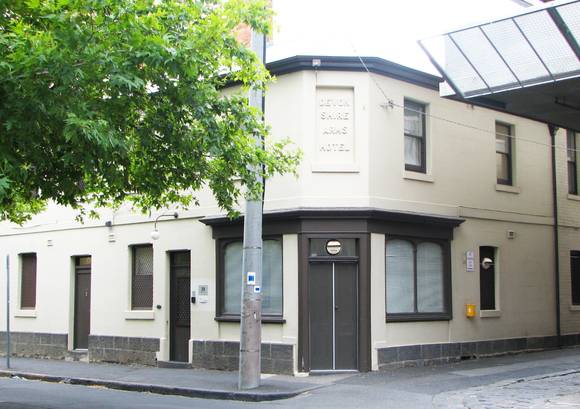| Back to search results » | Back to search page » |
|
FORMER DEVONSHIRE ARMS HOTEL
Location34-38 FITZROY STREET FITZROY, YARRA CITY
File Number600503LevelRegistered |
|
Statement of Significance
What is significant? The former Devonshire Arms Hotel was erected in Fitzroy Street
Fitzroy c.1843 by Francis Clark, businessman, land speculator and
Melbourne City Councillor. The hotel received its license in 1843. The
Devonshire Arms was constructed of face brick on a bluestone plinth
with a hip-and-valley shingle roof. The original building contains
early construction materials such as pit-sawn timber and hand-made
nails. A stable and kitchen was added in 1849-50 and, given the good
condition of the remaining shingles and the hand-made nails used in
its fixing, it appears that the corrugated iron roof was laid at this
time. It is likely that these changes were made in response to the
1844 NSW licensing regulations governing sleeping accommodation. The
1870 Licensing Act resulted in further changes to the building when
the kitchen was built over by the residential wing at the rear. It
appears that the building was rendered at this time and windows
replaced with the existing large-pane double-hung sash windows. Later
renovations added such features as the ground floor pressed metal
ceilings, but the building retains many of its earliest internal
features, including two early timber mantles with brick hearths, the
hotel and residence stairs, the lath-and-plaster ceilings and walls,
remnants of hessian wall linings and many doors and architraves.
Externally the building retains its original bar windows, gutter
brackets, hotel sign on the side wall and shingles (under the
corrugated iron). How is it significant? The former Devonshire Arms Hotel is of historical and architectural
significance to the State of Victoria. Why is it Significant? The former Devonshire Arms Hotel is of historical significance as a
very rare remnant of the social fabric and built environment of early
Melbourne and Fitzroy, as well as for its associations with Francis
Clark, a prominent local businessman and land speculator, and JC
Passmore, the establishment's publican between 1845 and 1847. The
former hotel is located in the area of the earliest subdivision in the
then district of Collingwood and still linked in context to the early
residences of Gertrude and Brunswick Streets. Receiving its licence in
1843, it is Melbourne's oldest known extant hotel. The choice of name
for the hotel provides a clue to the social origins of this earliest
part of Fitzroy. Although Clark himself was born in Essex, he
recognised that in 1840s Fitzroy, before the arrival of large numbers
of gold-rush immigrants, a large proportion of the population hailed
from south-west England. The choice of name reflects the important
social function of hotels as gathering places and denotes the building
as an integral part of the early Fitzroy community. The building
provides a significant physical link to Melbourne's very early days as
a frontier town, illustrating both the nature of the built fabric of
the times and something of the character of social life. The former Devonshire Arms' links with early Melbourne are emphasised
by its associations with JC Passmore and Francis Clark. Passmore, the
hotel's publican from 1845 to 1847, later ran John Pascoe Fawkner's
Hotel, changing its name to the Shakespeare Hotel. In 1865 he became
the licensee of another Devonshire Hotel, in New Street, Brighton. Francis Clark owned the former Devonshire Hotel for approximately 50
years. He had arrived in Melbourne in 1840 and in 1842 became Manager
of James Palmer's lemonade and soda factory. In 1845 he opened a
butcher's shop near the corner of Bourke and Elizabeth Streets and
later opened a shop in Richmond. Clarke appears to have made most of
his wealth speculating in land and buildings in the Fitzroy and
Alphington (now Ivanhoe) areas with the result that he died a wealthy
man in 1896. The hotel provides a link with this early Melbourne
identity, who was a significant figure in the history of early
Fitzroy, being part of the agitation that led to the greater
recognition by the Melbourne City Council of the area in which the
Devonshire Hotel stood. Clarke was an unsuccessful candidate in the
first elections for the newly-created Fitzroy Ward in 1850. However,
he was elected to the Melbourne City Council in 1852. The Former Devonshire Arms Hotel is of architectural significance as
it epitomises the earliest traditions of building in the founding
years of the state of Victoria. The building provides important
evidence of the way in which the built fabric of Victoria developed,
both in its display of early construction techniques and materials and
because of its very early and primitive colonial forms such as the
chamfered corner, the bar windows, and projecting roof eaves.
Group
Commercial
Category
Hotel







